If you haven’t searched Google for an alternative to doorway pages, then you might think this article is about BlackHat SEO techniques. If doorway pages are against Google’s Guidelines, doesn’t that make any alternative wrong, as well?
Well, the answer to that can be nuanced, because sometimes webmasters have no alternative. They need to create multiple, similar pages, but fear that Google’s algorithms will see them as doorway pages and penalize the entire website for that. Their only option left is to not create these pages at all, leaving their websites empty and their business ideas stuck.

Most articles out there just describe how bad it is to create doorway pages and how damaging it is for the internet (which I will address in this article as well), but fail to provide a reasonable answer or actionable tips to overcome this obstacle, given the fact that you might need to create similar pages that target multiple cities or services.
In fact, people who are searching for a doorway page alternative are trying to follow the guidelines, but don’t know how. If you’re finding yourself in the situation described above, then you’re in good company. The purpose of this article is to clear up some misconceptions about doorway pages, explain what they really are and how to deal with them properly.
- Defining the Doorway Page: An Evergoing Confusion
- Great Examples of High Ranking Doorway Pages at Work
- What Google Says You Should Do When You See Doorway Pages
- The Best Doorway Page Alternative: Break the Rule
For example, it’s a popular belief that “service A in city X, service A in city Y, service A in city Z” are considered doorway pages by Google.
There might be people offering the same service in different locations. What they fear is that Google might see those pages as doorway pages and penalize his website.
Before we get on though, let’s make sure we really understand what a doorway page is.
Defining the Doorway Page: An Evergoing Confusion
In the past years, there have been many definitions for doorway pages. Due to the fact that Google’s official definition isn’t very clear, webmasters have been asking Google officials and different technical SEOs for explanations. This ultimately led to more confusion, as each definition added something new to discuss about, but none gave a clear example of what a real doorway page is or an alternative to them.
I will cover just a part of them, the ones coming from the most authoritative sources I could find:
Doorway Page Definition #1
The first definition that we will cover is the one from Google’s official page itself:
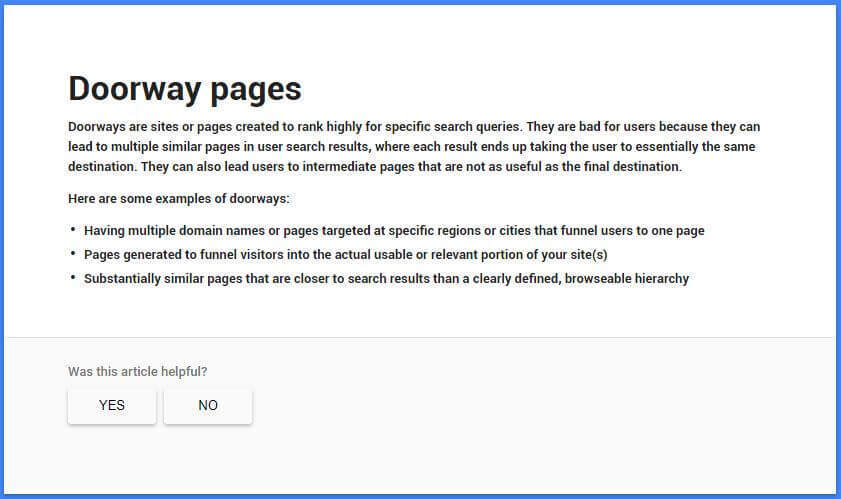
This definition is part of Google’s Guidelines, so breaking the rules above can result in a penalty. It’s funny, because it says “Doorways are sites or pages created to rank highly for specific search queries.” If you haven’t laughed yet, give it a couple more years of SEO practice and you will.
We all know that almost every page on the internet that ranks highly on a specific search query has been created to rank highly on specific search queries. The internet, search engine optimization and Google would not make sense otherwise.
If you decide to use multiple domains, with exact match names to the search queries, then you’re boycotting yourself anyway, as all the equity from the backlinks that you earn or build will be spread. This means you’ll have to work double for each new domain you have. If you build the same links everywhere, then you risk getting yourself into other trouble, such as being viewed as a Private Blog Network.
However,the part with user experience is a but fuzzy. Let’s say we have two very similar pages ranking on different keywords and two different visitors. Visitor 1 lands on page A and visitor 2 lands on page B. Ultimately, they both arrive on the same contact page. Why would their experience be bad? Just because the other visitor got to the same place through a different page?
Multiple listings of the same domain or very similar results on the same keyword are at most an issue of duplicate content, which is Google’s problem to fix. On big websites, with hundreds or authors and thousands of posts, it’s impossible not to cannibalize at some point.
Doorway Page Definition #2
There’s a more recent update on doorway pages on Google’s Official Webmaster blog.
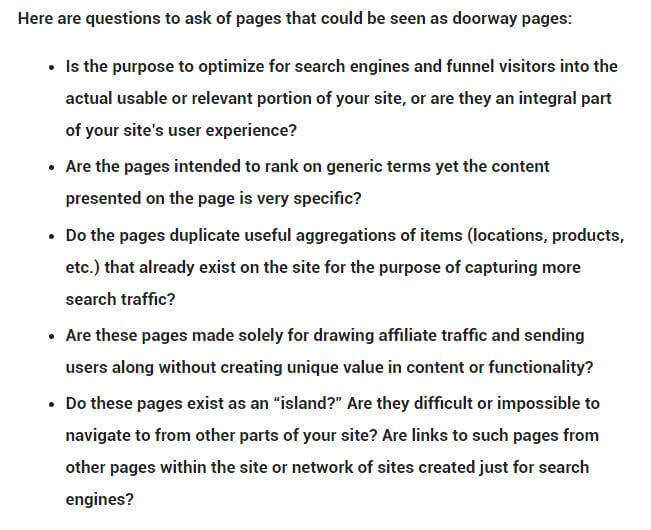
In this definition, we learn some new things, such as the fact that location or product pages are not doorway pages if they don’t already exist in another place and that the pages must not be isolated, but accessible from the website’s navigation.
Doorway Page Definition #3
Wikipedia provides a more detailed explanation of what doorway pages really are and explains more complex concepts.
In this definition, we learn that doorway pages are portals that actually lead visitors to the same page, either through redirects or cloaking. Apparently, doorway pages are easy to identify, as their content is usually copied from other websites.
However, the wiki states that more complex doorway pages are designed to rank high in the search engines on their own, without using redirection or cloaking. These are called Content Rich Doorway Pages and usually look like a normal page of a website.
My question is… what if they actually are a normal page of a website? What then?
You can read Wikipedia’s definition here.
Doorway Page Definition #4
Among other definitions and interpretations from bloggers and technical SEO professionals around the internet, one more was compelling enough to present:
John isn’t very explicit and you probably have to rewind a little to understand the context of the question, but he states that doorway pages are a large collection of pages where keywords are constantly tweaked out in order to rank them higher for specific keywords.
However, an interesting thing that he says is about what’s a reasonable result:
| I think that if you focus on a clear purpose for the page, that’s outside of just ‘I want to rank for this specific variation of the keyword’, that’s usually something that leads to a reasonable result. | |
 |
John Mueller |
| Head of Spam at Google / @JohnMu | |
So… From what John says here, we can understand that a page is or isn’t a doorway page, depending on what the webmaster had in mind before creating it. Does Google read minds lately? Holy #@!$ then!
Joke aside, regardless of whether Google can or can’t read the minds of webmasters, John is right (obviouslu). If a web page is created strictly for the search engines, then most probably it is a bad one for the user.
However, these kinds of statements are true for old search engines. Modern search engines use metrics like user experience a lot, so building a doorway page for a modern search engine means taking the user’s experience into consideration. Today, a page could have good user experience and still be created for the sole purpose of being ranked high.
I’ve also found an unsourced definition by John, where he supposedly said that doorway pages are multiple pages or URLs that point to the exact same content.
What a Doorway Page Really Is
By now, you should either have a clearer idea of what doorway pages really are, or… be completely confused. In my opinion, the definitions above don’t quite explain what Google sees as harmful in terms of what they call a doorway page. But yet, when has Google ever been clear with anything regarding SEO?
Well, I will try to give a better, more detailed explanation of what doorway pages really are:
Doorway pages are a set of very similar, multiple pages that target similar keyword phrases or variations of multiple keyword phrases. They are usually created in bulk by simply replacing some part of the keyword phrase. The purpose of these pages is to solely target a lot of keywords very quickly, without adding any real value or having the user experience in mind.
They are basically some landing pages with very low quality content, that only try to focus on how to beat a robot instead of focusing on how to help a human.
However, the term ‘value’ can be vastly interpreted. For example, if the user lands on the doorway page and ends up getting good business, then the doorway page is of value to him, as without it, he would’ve never got there. It’s the same as with cold calling. It’s really annoying when someone insists on selling you something over the phone, but if you ask those who work with the seller, you might find that it’s actually good business and that they’re glad they got called.
What Google is actually trying to avoid is large numbers of spammy pages that don’t actually have a purpose, tricky redirects and the clogging up of the internet with useless stuff. For example, building doorway pages for all the cities in the United States might not be such a good idea, if you don’t actually provide the service to all those cities. You should just focus on the few that you do provide real service to.
Truly harmful doorway pages should meet some of the following criteria:
- They can’t really be accessed from the website’s navigation or anywhere else on the site
- They’re not presented in a structured, hierarchical manner
- They redirect the user immediately to another location
- They use spammy content techniques, such as spinning or hiding content
- They don’t provide any value at all (for example, they don’t actually provide the service in that location)
- They are created on multiple domains.
Now the question that remains is… Where do you draw the line between what’s good and what’s bad?
Well, one might say that the line is drawn between creating a page just for the sake of ranking with it and creating a page for user’s experience.
Now a lot of SEOs talk about this, but we all know that’s not the case in real life. I mean, let’s be honest: give me just one example of someone that uses SEO as a marketing strategy, but creates pages just for the user, without ever thinking about ranking it high in Google search?
Things are plain simple. The usual framework goes like this:
- You want more traffic
- You find a high volume keyword
- You create a page and optimize it in order to rank high
- You tweak user experience and do anything in order to keep ranking
Even if you go the other way around, you’ll still end up in a similar situation:
- You have this great topic or the solution to a problem
- You write valuable content only with the user’s experience in mind
- You want to promote it and reach as many people to help them
- You need to find a high volume keyword
- You need to optimize the title and content for that keyword
- You do anything in order to keep ranking
I just think that if you create multiple location pages you aren’t actually harming anyone. As I previously said, in 2018+, if you want to have a high ranking page, you must take the user’s experience into account.
I hope that now you have a clear understanding of what a doorway page really is and have realized that, sometimes, a doorway page isn’t necessarily harmful in anyway.
Great Examples of High Ranking Doorway Pages at Work
Most issues regarding doorway pages are about services in multiple cities. There aren’t many possible scenarios here. It’s either a remote service, usually digital marketing, or a team that can travel to provide the labor. There are also local businesses with multiple locations, but that story is a little different.
However, these are not the only cases in which location doorway pages apply. There’s one more: listings. For this, I have some great examples. And they’re not examples of doorway pages that got penalized, but examples of pages that rank very high.
Doorway Pages Example #1
Here are two pages that are very similar and target the same service, car rentals, but in different regions (New York and Massachusetts).
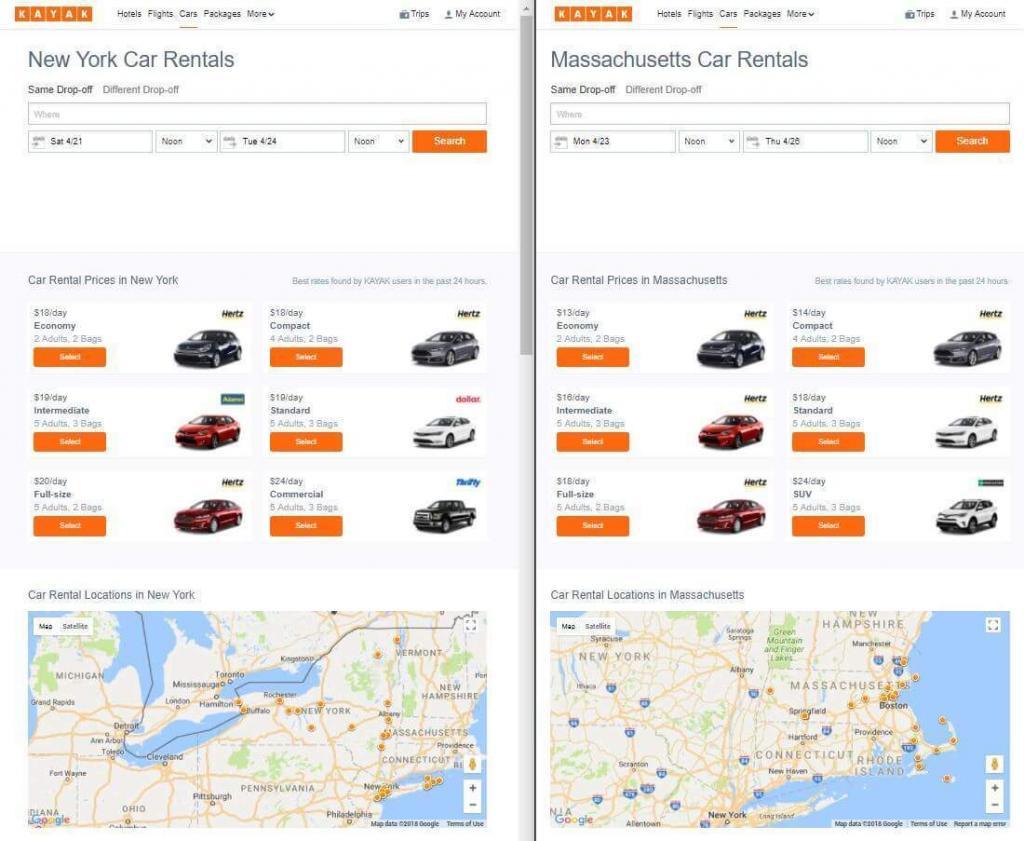
Screenshot presenting an example of two doorway pages
I’ve even performed a Copyscape and a Copyleaks run to make sure pages are very similar. Copyscape said that 98% of the words found on one page were found on the other as well, while Copyleaks said that over 60% of the text is identical.
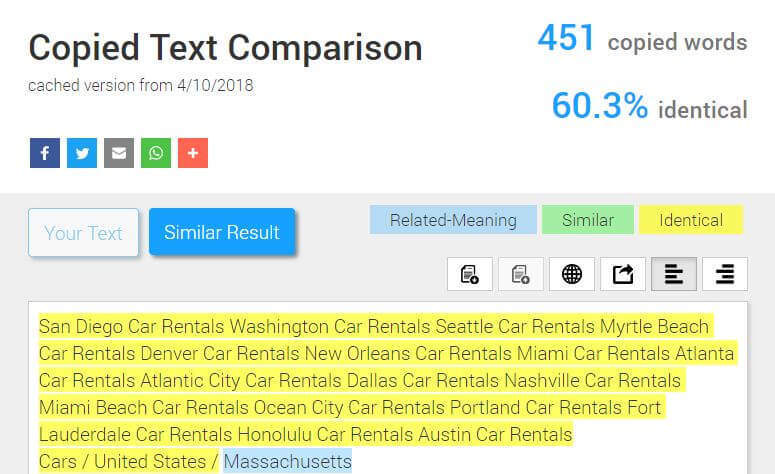
Screenshot showing the similarities between the text on the doorway pages
If you scroll down, you can see that these aren’t the only ones. There are way more:
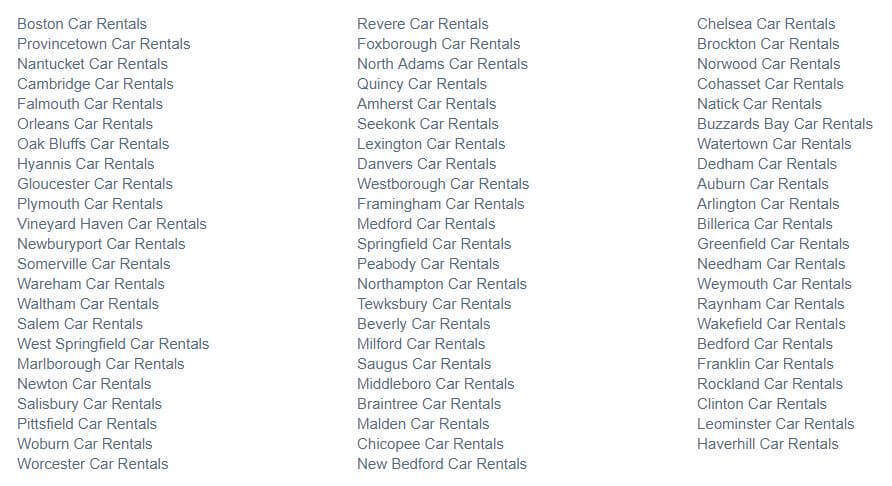
List of doorway pages near the footer of a website
Are these doorway pages? Yes.
Are they ranking high? Hell yeah, they do.
Are they harmful for the user? Not at all.
Doorway Pages Examples #2
Here’s another example of product listings, from the biggest e-commerce store here in Romania (similar to Amazon).

Example of eCommerce site showing search-like doorway pages
Let me translate that for you. It says: “Are you looking for a Bose Car Audio System? Discover eMag’s Offer.”
And that’s not the only page. The store has replicated this for thousands and thousands of queries. Pretty much all of them rank high without problems (because of the authority of the domain), as long as they are about a purchasable item that the store is selling.
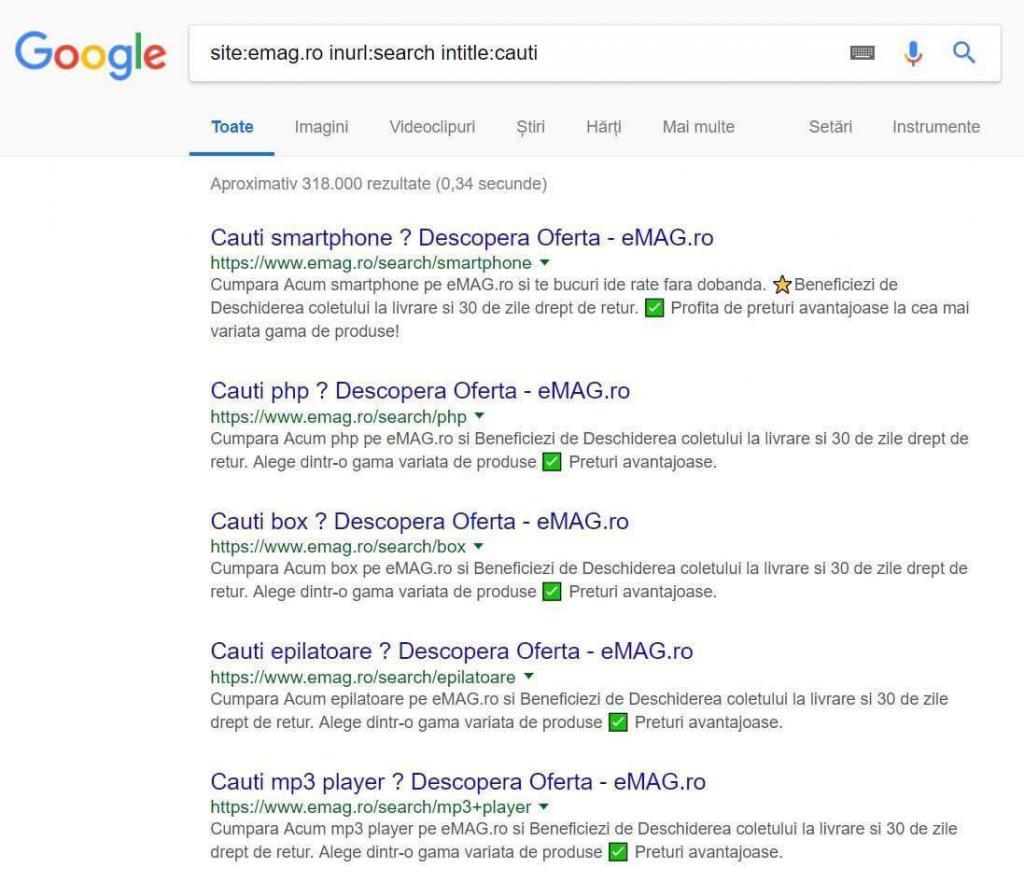
Examples of search results doorway pages
Here’s a Google translated version. It’s not the best, but I hope you’ll get a better idea of what the example is about:
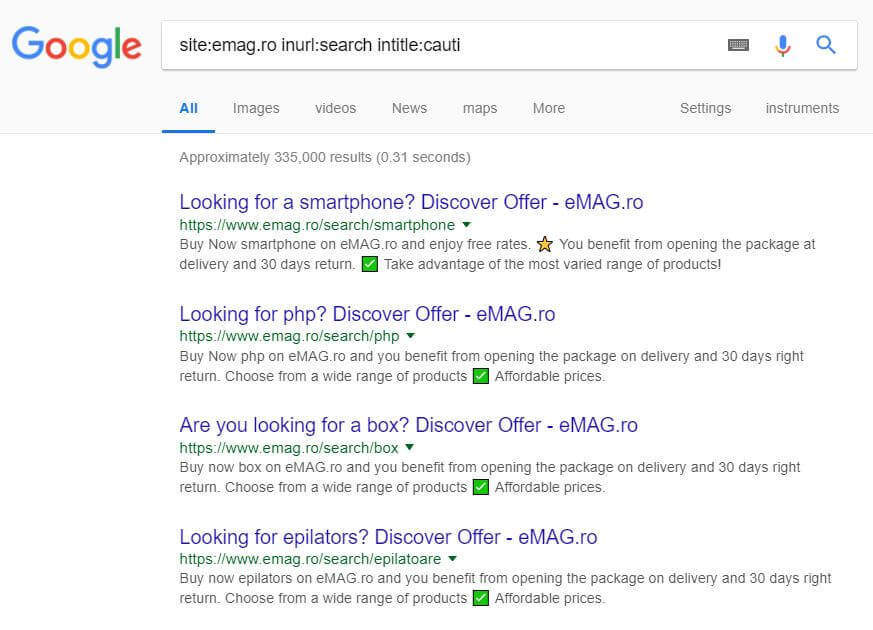
I mean… look at the second one! In the meta description it says “Buy PHP now! PHP now available on eMag.” It even talks about shipping benefits… shipping PHP. It’s really funny, actually!
Now you might be thinking that these aren’t doorway pages, but just indexed search pages from the queries the users type in the search forms. Well, from Definition One (the official one from Google), we know that they can be “Substantially similar pages, that are closer so search results than a clearly defined, browseable hierarchy.”
In eMag’s case, these are not ‘closer to search results’, these are actual search results. Although the ones above might not be very similar because they target very different keywords, there are probably hundreds if not thousands of very similar queries. However, they are definitely similar, if not identical in terms of graphic and web design and structure.
These pages are clearly intended for the search engines. You can see this from looking at the meta descriptions, which are buyer oriented and focused on improving the CTR (they have the phrase ‘buy now’, ‘cheap prices’ and even include emojis that catch the eye).
Also, these pages aren’t browseable from within the website. I couldn’t find any internal links pointing to one of them. The only way to get to a search result page from the site is to type the query in the form and hit Enter. They’re clearly doing this only to get more traffic, because their category pages are limited. The webmasters are also clearly doing something to get those pages well indexed, either through the Google Search Console, sitemap or hidden links.
Are these doorway pages? Yes, they pretty much are.
Are they ranking high? Every single time.
Are they bad for the user? No, I don’t really think so.
Most of them don’t harm the user with anything, but the second one about PHP might harm someone that searches for PHP and ends up with that result. This is what Google doesn’t want. It doesn’t have a problem with all your doorway pages, just with the ones that harm the user.
What Google Says You Should Do When You See Doorway Pages
I actually have another example, but it’s in the erotic stores niche, so I decided to pass it and not list it above. We’re going to talk a little about it, however, because it has a morale in it’s story. This website, full of doorway pages, was very new in the market and yet it outranked some of the most authoritative websites in that niche, which have been in business for over 10 years.
It didn’t quite seem fair to me, so I decided to test this out and see if anything happens. First I took Matt Cutts’ recommendation and used the spam report form to anonymously report the website, which has been ranking for over 2 years now. Half a year later, nothing changed.
What was really getting on my nerves was that fact that although this site was clearly low quality and the content was 99.9% identical, except for the name of the city, it ranked better than websites way older than it, that even had physical locations with Google Maps Listings and adjacent location pages. I should also mention that the respective website also was doing a ton of social media spam and manual link building through blog commenting.

Was that site bad? I don’t know, I never ordered anything from it (although now you’ll definitely not believe me…), but it clearly looked bad to me in terms of web design. However, I did this mostly to test things out and see what happens. Those were clearly fitting the criteria for doorway pages , but apparently, it wasn’t harming the user enough for Google to penalize it. It still ranks high to this day.
I’ve also sent this very example to John Mueller via Google+, asking him for advice, but he didn’t reply. Same story happened on Twitter, when asking him about the doorway pages issue. I don’t know if he missed the messages or was very busy, but in other occasions, such as questions about content with and without diacritics, John appeared very willing to reply and he was also fairly prompt.
I think this indicates the sensitivity of the subject and the fact that a clear line can’t really be drawn between what is and what isn’t a doorway page.
This leads me to another topic I’ve had in my mind for a long time, about how spammers and blackhat SEO techniques end up affecting everyone, even the webmasters that play fairly. However, I’ll cover this in another article, so stay tuned on cognitiveSEO’s social media channels.
The Best Doorway Page Alternative: Break the Rule
Disclaimer: By no means am I saying that you should violate Google’s guidelines or use spammy methods in your SEO strategy. This conclusion is a result of vigurous study and observation over the years. The below statements are just a series of personal recommendations.
I’ve heard about some doorway page alternatives before, coming from search engine optimization professionals or even content marketers. One was to simply call them Essay Pages and build quality, original content on them. The other was about location pages and how they might seem like doorway pages. In order to avoid that, you should silo them into greater structures, even separate entities of their own.
You know what the thing is? They’re still doorway pages.
If you call them essay pages, landing pages, or if you build structures and links to them, they are still within the patterns of what Google describes as a doorway page.
The second one can even lead to people building subdomains instead of pages for each page and it doesn’t even cover every corner, because it only refers to businesses that have verified locations (and includes local SEO tactics, such as links from the Google MyBusiness listings). Also, most local businesses don’t have multiple locations, so the doorway pages issue more likely applies to businesses that can travel or perform their services remotely.
We could come up with other extreme strategies, such as cannonicalizing all the location pages to a single, general page, where you can list all the services you offer and locations you work in. This was recommended by Google as a solution to duplicate content issues for eCommerce website owners, when products had multiple pages for each color variation.
Although Google will correctly index the content on every page and just display another page instead, a problem remains: the click through rate. The title’s length is limited. If someone searches for “Product + Yellow” and your title is “Product + Red, Green, Blue, Violet and Yellow” but Google only displays it as “Product + Red, Green, Blue, Vio…”, then your CTR is likely to go down. Even if you’re the first result, if the second result is “Product + Yellow”, its CTR will be higher (unless you’re a really big brand like Amazon and users trust you).
Until Google provides a viable option for variable/dynamic titles in the search results without indexing multiple URLs and displaying just the ones that are needed, then separate pages are still the best solution. Other ideas like those above are extreme and harmful for webmasters.
So here’s the truth. You want to know it? There is no such thing as an ethical alternative to doorway pages. There. I’ve said it. You either have a doorway page or you don’t. You have to break the rule. Others have done it and I’ve shown you that it works. You know why? Because it isn’t a bad thing, not in all cases, at least. If you already have some doorway pages, shutting them down would mean kicking your clients out.

When you shut your doorway pages and lose visitors.
If you really need/want to target different cities, you will have to create multiple pages for each city. Why? Because the alternative is to create a single page targeting all those keywords, which we both know won’t work out (Google knows as well).
However, there are a set of rules to protect you from getting penalized by Google for use of harmful doorway pages:
Don’t use multiple domains: This is definitely a bad idea. First of all, it is spammy. Second of all, it costs a lot more. Thirdly and most importantly, it’s actually dumb, because you will be spreading the link equity here and there, making it harder to rank in the end. You should only do this if you have a really good reason for it, such as a completely different departments in your company, or a completely different niche.
Don’t redirect or cloak: This spam technique is bad for the user. Since Google is pretty good at returning relevant results depending on the users’ intent, using cloaks or shady redirects will not show the visitors what they were expecting.
Have a hierarchy: If the pages that you create aren’t clearly included somewhere on the site and reachable within one of the navigation systems, then there’s a clear problem.
Avoid duplicate content: If you don’t want to get penalized by the Panda Google Update, then you should avoid copying content from other sites and even from your own pages that have been already created.
Avoid bulk creation mechanisms or monitor them properly: It’s better to avoid these kinds of systems and craft your pages with great care. However, if you do have one in place, make sure you monitor it properly. Remember eMag’s funny PHP example? Well, we had jokes on social media with print screens or eMag results containing “Looking for slaves or gypsyes? Discover eMag’s Offer”. I’m not sure if they were real or not, but if a troll started typing those keywords in eMag’s search form and the form automatically generated a page for indexing, anything’s possible. This can be risky for your brand’s image, so take great care.
Then, just treat them like regular pages on your website.
Consider the user’s experience: This is important for your own profit, as well as for keeping your ranks high, since Google takes user experience into account.
Get some quality links, preferably from local websites: If you can get relevant links to each page, that’s great. The more localized they are, the better they will rank in that particular region. Don’t over stress with links though. They’re usually hard to get in different circumstances. Create a blog and focus on getting some interesting content there. Then, create an internal linking structure that will endorse the category pages you want to rank high.
Conclusion
In my opinion, there is no ethical solution or alternative to doorway pages. Sometimes, they are simply needed because without them you might not be able to publish your services on the internet.
Although it’s a bad idea to use spammy techniques and you should be very careful when creating pages that fit some of the criteria of doorway pages, you shouldn’t avoid creating them at all. And to be honest, I don’t even think location pages are doorway pages. If it’s true for them, it could be true for any other page. I think it’s just an issue of scammers and spammers overdoing something that ultimately leads to harming innocent people as well.
As shown in the examples above, the truth is that, in the end, Google will decide if you get penalized or not. There are plenty of websites using pages that resemble doorway pages and rank very well, because they solve the user’s issue and don’t harm the internet at all.
I’d be happy to hear your opinions on this below, in the comments section below. If you have something to say or any questions to ask, feel free to leave a comment and I will gladly reply.
The post Doorway Page Alternatives. How Google “Forces” You to Use BlackHat SEO Techniques appeared first on SEO Blog | cognitiveSEO Blog on SEO Tactics & Strategies.
Via Marketing http://www.rssmix.com/
No comments:
Post a Comment